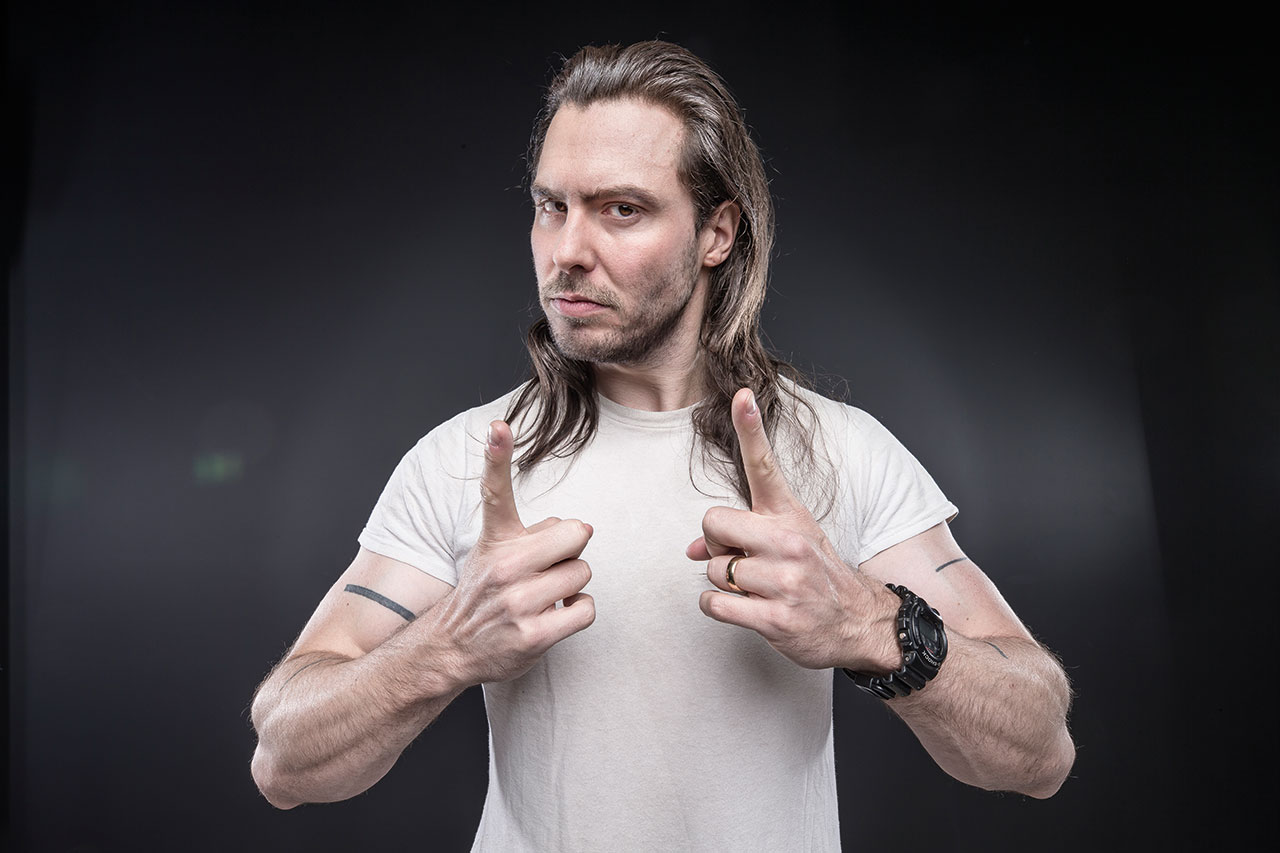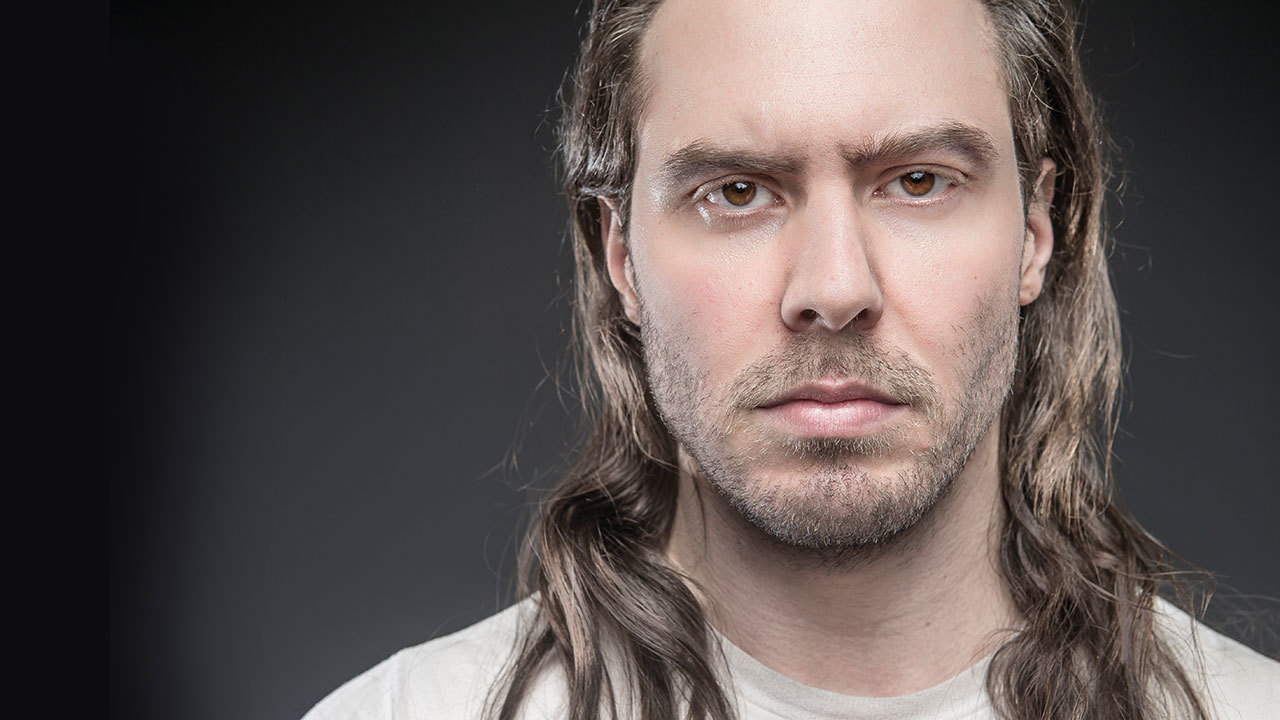Even with a baseball cap pulled low over his face, the man walking into the room is unmistakable. White T-shirt. White jeans. Shoulder-length dark hair. The only thing missing is his trademark bloody nose.
Andrew W.K. arrives alone today. No manager, no publicist. He reaches out his hand and politely greets us, before making himself comfortable on an old chest in a quiet corner of this chilly photo studio a couple of hours outside Chicago. We ask if he wants to sit on the high chairs in front of the flashbulb-studded vanity mirror. He declines. We ask if we can sit next to him. He declines again; he prefers to sit opposite interviewers. What follows is an exceptionally intense couple of hours – unexpectedly so for an encounter with the self-described King Of Partying.
Bursting onto our screens in 2001 with his riotous video for Party Hard, Andrew W.K. split opinion. To some, he was the crusading idealist we needed, creating anthems that encouraged people to let go. To others, he was a joke figure who was ruining heavy music. Yet his career expanded into new realms: he co-founded New York club Santos Party House (though it’s since closed), hosted the children’s gameshow Destroy Build Destroy, DJ’d on Black Sabbath’s 2013 tour and became a motivational speaker, even giving a talk at the Oxford Union. Now he’s poised to release his first true rock album since Close Calls With Brick Walls – 12 years ago. But he is worried.
“You realise that time can go by very quickly – especially when you’re partying very hard,” he deadpans. “And for better or worse, so much of what I’ve had the privilege of doing has been presented to me as opportunities, meaning a lot of what I’ve wound up doing, I didn’t choose to do in the traditional sense of coming up with a particular project. You start to realise that some of the best things that you’ve ever done have very little to do with you. You just showed up for the assignment.”
He is visibly disturbed, his body tense. At the same time as getting these amazing breaks, like partying with the godfathers of heavy metal, there was some unsettling static in the background; something intangible and unnerving. He feared he was failing to take control of his own destiny.
“It was at times very confusing and distressing,” he sighs in frustration. “I thought maybe I was being really irresponsible. I was looking around at other people that seemed very successful. ‘Are they setting goals? Are they being more cutthroat?’ I couldn’t deny that what I’d gotten to do brought me to where I was now, and I had to assume it was all for the best. And if I thought of all the other avenues I could have taken, it almost seemed disrespectful to all the good things that had happened. So it almost seemed like it wasn’t my concern. Which is a very strange feeling – to think that your own life or work isn’t your concern. It is not up to me.”
He believes in a higher power, though not necessarily the ‘Party Gods’ he flippantly refers to elsewhere in our conversation. It’s something that’s bigger than him, whether it’s another person or a group of people, or some vague “other forces”. Again, this idea, this not knowing, bothers him. That word comes up again: distressing.
“I turn myself over to these forces. Whether they’re higher, or maybe it’s a lower power,” he says, brow furrowing and staring hard into the middle distance. “That’s the real question – that’s where it can get very distressing, because you think, ‘Well, maybe I’m doing the exact opposite of what I’m supposed to be doing.’
“Now, for the first time, I’m trying to listen to a voice inside that has always been there, but I never had the courage to listen to 100%. And since I’ve been listening to it, I’ve definitely felt a level of… I guess joy. A kind of quiet, subdued, maybe even melancholy joy, that I’ve never felt before. Where all of the dread that surrounded a lot of my activities or decisions has been removed.”

New album You’re Not Alone is the result of listening to that voice. It is, he says, the record he’s been trying to make since 2005. A bombastic, euphoric, fist-in-the-air set of major-key songs with guitars and piano at the heart, it plays out like a soundtrack to the most uplifting musical you’ve never heard. The lyrics acknowledge the hardship of the human experience, but advocate pushing through. The vocals are multitracked – he’s previously commented that he wants listeners to feel as though his music bears an everyman voice, not an individual one – and the flow is disrupted by three short motivational speeches.
“I recorded those almost sort of spontaneously, and had a very hard time listening to them afterwards,” he admits. “Because that was the most exposed thing. The album is so laboured over, and the layers of music bolster me and make me feel bigger and stronger and more powerful than I am when it’s just me talking – not even singing – alone, where you have the power of melody to infuse your voice with beauty. But, I’m glad they’re on there.”
The album fits with his much-publicised commitment to Party Hard. He’s written extensive columns, essays, letters and tweets about what that actually means, going beyond the conventional meaning of getting drunk with mates and cutting right to the heart of living a meaningful life. When we ask how much of him as a person is in the record, and how much of it is Andrew W.K. the performer, he talks of how they both cyclically feed into the “mission”.
“That’s the same thing. I feel like I’ve been given the opportunity to generate this life-affirming feeling – literally like a life-force feeling. This mission for me is that if someone says, ‘Oh, there’s that Andrew W.K. guy,’ I want the feeling they get to be like they just took a big breath, or they just drank a bunch of coffee. They feel like they’re alive and they can do something with it. But I wanna get that out of it, too. That’s what Andrew W.K. is supposed to be for me – to make me feel amped-up about not being dead.”
Have you struggled with depression in the past?
“That was the beginning of the whole musical thing, back when I was five years old, with my piano teacher playing me songs,” he explains. “It was realising that there were few things that made life feel different. And it wasn’t just a surface difference, it was an internal, physical difference. The mind is just there to interpret, at best, what’s actually going on in your body. And music made me feel alive. Every time. It was sort of like this orgasmic feeling.”
There has long been an aura of mystery around Andrew W.K.. In the mode of a self-help book, his language is deeply analytical, reflective and intimate, yet he never gives too much of himself away. In the late 2000s, there were rumours – which he strenuously denied – that his persona was manufactured. There were also lengthy legal troubles that prevented him from releasing music in the US, leading up to his improvisational piano album, 2009’s Cadillac 55. We don’t even know what we’re doing in Chicago today; last we heard, he had a place in New York. He tells us that he left the city four-and-a-half years ago, that he and his wife, Cherie, have been bouncing between short-term situations, and that it’s almost like being on the road in his early days. To make this album, he’s spent time in Illinois, Texas, California, New York, Florida, Wisconsin and Arizona.
“There was a time… things became shadowy in New York, maybe right after Close Calls With Brick Walls up until now,” he says. “Some of the best things happened, like meeting Cherie, but also some of the most challenging experiences. Real complications with business, decisions I made that came back to bother me and haunt me and challenge me. And there was also an effort where I thought that if I could go against myself enough, I could become someone else. And so having a home, for example, was a real effort in thinking that if I did that, I was going to feel this happiness – be like a real person. But deep down inside, you’re just building up more and more tension against your true self. And I think I’m now trying to just do what I’m meant to do, instead of what I think I should do.”
We press him on his personal circumstances, but he won’t be drawn. If he’s angry, he doesn’t show it. Although for a large portion of our chat, he adopts the pose of Auguste Rodin’s statue, The Thinker, oddly enough on display in Chicago’s art museum. Body hunched, chin resting on fist. He explains that he doesn’t want any peripheral circumstances surrounding his life to cloud his mission, and falls back on the analogy of a basketball player who needs to score goals. The player is still himself when he’s on the court, but he’s using his body and mind to focus on the task, and the space is clear of any unnecessary distractions.
“I feel like I have this sacred chance that I’ve been given to try to hit this mark,” he says. “And I don’t want anything to stand in the way of that. I’ve seen how my own weaknesses can. Which doesn’t mean things I’m removing are bad things, like my family, or personal stuff – I just feel like it’s a sacred space. I don’t want to pollute this for myself, with myself.”
What are those weaknesses?
“Oh, just anything that anyone would be able to relate to, I imagine. Maybe not on the level that I am afflicted with these things. But negativity, resentment, anger, laziness – all the negative emotions. And there’s ways to use them, in the background, very effectively. I can be very motivated by what might seem like petty competition, and revenge fantasies. If that gets me up that day, and pushes me to do the work, that’s just as good. It’s probably not the highest mode to be working in, but whatever gets the work done.”
Our time with the Party King is almost over. Far from the crazy funtime we thought it might be, it’s been a brain-straining philosophical conversation that has prompted as many questions as it has answers. Despite having achieved his aim of making a moving new record – which unashamedly fills the listener with that intended rousing life-force – Andrew W.K. still seems troubled. We ask how he is feeling.
“Right this second?”
Right this second.
“Well, maybe…” he pauses to consider his options. “Slightly distraught. Because I want to do a good job, of the interview and with the photo- shoot, and I don’t have control over it. I always wanna feel like I did the best I could, for the opportunity.”
And there he is again, worrying. He is a man who has made a career out of his coping mechanisms, who has turned optimism into a lifestyle, and has managed to sweep thousands of music fans along with him. For someone who keeps people at arm’s length, he’s exceptionally real.
Ever reaching towards that higher state of being, he wants to leave the conversation on a positive note.
“The last thing I’ll say is that before this album, there was a lot of confusion. And coming out of that confusion, one thing I was always clear on was that there was always certainty about music, and that I could really count on it. And I hope this album gives that clarity to other people. That music is this higher power, and we can embrace it as a type of real truth.”
You’re Not Alone is out now via Music For Nations. Andrew W.K. tours in April
Andrew W.K. - You’re Not Alone album review
Andrew WK: Why music is worth living for and what it really means to party

